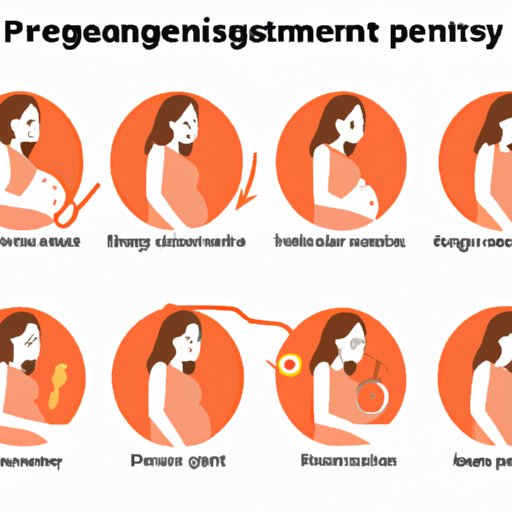
I. Introduction
Recognizing early pregnancy symptoms is crucial for many women who are trying to conceive or those who are sexually active and not on birth control. Acknowledging these symptoms can alert women to take necessary precautions for their health and their baby’s during pregnancy. In this article, we will explore when pregnancy symptoms may start and what to expect during the early stages of pregnancy.
II. The Early Signs of Pregnancy – Understanding When Symptoms May Start
Many women are familiar with common symptoms of pregnancy such as morning sickness and tender breasts. However, pregnancy symptoms may vary from person to person, and not all women experience them to the same degree. The most common first signs of pregnancy are a missed period, nausea, and breast tenderness. These can appear as early as a couple of weeks after conception and up to several weeks after the missed period.
It’s important to note that some common misconceptions surround early pregnancy symptoms. For example, many people believe that implantation bleeding (light bleeding after the fertilized egg implants in the uterus) is a common sign of pregnancy. However, bleeding can be a sign of other medical conditions, so it’s essential to seek medical attention to rule out any concerning causes.
III. How Soon Can You Experience Pregnancy Symptoms? A Comprehensive Guide
A variety of factors can affect when pregnancy symptoms appear, including the woman’s age, health, and reproductive history. Typically, pregnancy lasts around 40 weeks, divided into three trimesters. During the first trimester, the fetus is in the early stages of development. Therefore, pregnancy symptoms may start as early as the first few weeks of gestation.
To calculate when a woman can expect to experience pregnancy symptoms, health professionals use the date of the woman’s last menstrual period (LMP). The LMP helps doctors estimate when ovulation occurred, and the fertilized egg implanted in the uterus. On average, pregnancy lasts 40 weeks from the first day of the last menstrual period (LMP); however, not all women ovulate on day 14 of their menstrual cycle, so the due date may vary.
IV. The 5 Earliest Indicators of Pregnancy – What to Look Out For
In addition to missed periods, nausea, and breast tenderness, several other early pregnancy symptoms include fatigue, frequent urination, and bloating. These symptoms may not be exclusive to pregnancy; however, experiencing them together may be an indication of pregnancy.
Other early pregnancy symptoms can include food aversion, headaches, back pain, constipation, and mood swings. These symptoms may vary from person to person, and not all women experience them to the same degree.
If you experience any of these early symptoms, contact your doctor or healthcare provider for guidance on what to do next. While some symptoms may be harmless, others may require monitoring or treatment.
V. The Hormonal Changes: Timing and Symptoms of Pregnancy
Pregnancy hormones play a significant role in the symptoms women experience during pregnancy. Hormonal changes, particularly the increase in the hormone human chorionic gonadotropin (hCG), trigger many symptoms like nausea, fatigue, and mood swings. Additionally, the hormone progesterone slows the movement of food through the digestive tract, leading to constipation and bloating.
Some women may experience more dramatic hormonal shifts at the beginning of their pregnancy than others; this can affect when pregnancy symptoms appear and the intensity of these symptoms. If you are struggling with hormonal changes, it is essential to speak with your healthcare provider.
VI. Pregnancy Symptoms: How Soon is Too Soon to Recognize Them?
While many women may be eager to recognize pregnancy symptoms as early as possible, pregnancy tests may not always accurately detect pregnancy immediately after conception. Generally, home pregnancy tests can detect pregnancy hormones around six days after ovulation (12-14 days since the LMP), but the accuracy of the test may depend on the hormone levels in the urine;
Furthermore, some women may not experience pregnancy symptoms until weeks after the due date has passed, while others may experience intense symptoms right from the beginning. Therefore, while pregnancy symptoms are a good indication of being pregnant, other signs and tests are the most reliable indicators.
It’s important to note that if you experience severe symptoms like vaginal bleeding, severe abdominal pain, or dizziness, you should contact your healthcare provider immediately.
VII. Conclusion
Recognizing pregnancy symptoms and seeking medical attention when necessary helps ensure a healthy pregnancy. While the experience of pregnancy symptoms and their onset time may vary from person to person, understanding what to expect early on during pregnancy can be reassuring. If you are experiencing pregnancy symptoms or have concerns about your reproductive health, contact your healthcare provider.





